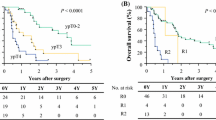Abstract
Background
In patients with locally advanced esophageal cancer who had undergone chemoradiotherapy (CRT), the limitations of radiological evaluation may necessitate surgical exploration to ascertain disease resectability. Upon intraoperative confirmation of T4b disease (sT4b), the optimal management strategy remains unclear. While some surgeons may opt against resection, others advocate for palliative esophagectomy (PE). Regrettably, the current literature does not provide a consensus on the most effective approach for managing these intricate cases.
Methods
The study cohort consisted of 68 patients with esophageal squamous cell carcinoma (ESCC) who presented with sT4b disease following CRT. The perioperative outcomes and overall survival (OS) were compared between patients who underwent PE (n = 56) and those who received an open-close (OC) procedure (n = 12).
Results
Patients who underwent an OC procedure experienced a shorter hospital stay (16.5 vs. 28.8 days; p = 0.052) and showed a non-significant reduction in the rate of major complications (33.9% vs. 25%; p = 0.549) and in-hospital mortality (0% vs. 5.4%; p = 0.412) than those who received PE; however, PE was associated with a superior 2-year OS rate than OC (9.6% vs. 0%; p = 0.009). In multivariable analysis, a pretreatment clinical stage of II/III (hazard ratio [HR] 0.51, 95% confidence interval [CI] 0.31−0.87; p = 0.013) and PE with retrosternal reconstruction (HR 0.38, 95% CI 0.15−0.49; p = 0.010) were independently associated with a more favorable OS.
Conclusion
PE with retrosternal reconstruction may be a feasible approach for patients with ESCC exhibiting sT4b disease after CRT.




Similar content being viewed by others
References
Huang FL, Yu SJ. Esophageal cancer: risk factors, genetic association, and treatment. Asian J Surg. 2018;41(3):210–5.
Depypere LP, Moons J, Lerut TE, Coosemans W, Van Veer H, Nafteux PR. Palliative esophagectomy in unexpected metastatic disease: sense or nonsense? Asian Cardiovasc Thorac Ann. 2018;26(7):552–7.
Janmaat VT, Steyerberg EW, van der Gaast A, et al. Palliative chemotherapy and targeted therapies for esophageal and gastroesophageal junction cancer. Cochrane Database Syst Rev. 2017;11(11):CD004063.
Lagergren J, Smyth E, Cunningham D, Lagergren P. Oesophageal cancer. Lancet (London, England). 2017;390(10110):2383–96.
Tamagawa A, Aoyama T, Tamagawa H, et al. Influence of postoperative pneumonia on esophageal cancer survival and recurrence. Anticancer Res. 2019;39(5):2671–8.
Low DE, Alderson D, Cecconello I, et al. International consensus on standardization of data collection for complications associated with esophagectomy: esophagectomy complications consensus group (ECCG). Ann Surg. 2015;262(2):286–94.
Yamada K, Nohara K, Enomoto N, et al. Surgical strategies for treatment of clinical T4 esophageal cancer in Japan. Glob Health Med. 2021;3(6):371–7.
Horváth Ö, Lukacs L. Palliation of esophageal cancer: palliative resection and bypass surgery. Dis Esophagus. 1996;9(2):117–22.
Sugase T, Kanemura T, Takeoka T, et al. Clinicopathological characteristics and survival outcomes in patients with advanced esophageal squamous cell carcinoma who were intraoperatively diagnosed non-curative. Oncology. 2023. https://doi.org/10.1159/000533772.
Fujii Y, Daiko H, Kubo K, et al. Non-curative resection for surgical T4b esophageal cancer: esophagectomy or non-esophagectomy? Langenbecks Arch Surg. 2023;408(1):201.
Urschel JD, Urschel DM, Miller JD, Bennett WF, Young JE. A meta-analysis of randomized controlled trials of route of reconstruction after esophagectomy for cancer. Am J Surg. 2001;182(5):470–5.
Yang J, Xu C, Lian D, et al. Esophageal reconstruction: posterior mediastinal or retrosternal route. J Surg Res. 2016;201(2):364–9.
Wong AC, Law S, Wong J. Influence of the route of reconstruction on morbidity, mortality and local recurrence after esophagectomy for cancer. Dig Surg. 2003;20(3):209–14.
Kato K, Shah MA, Enzinger P, et al. KEYNOTE-590: Phase III study of first-line chemotherapy with or without pembrolizumab for advanced esophageal cancer. Future Oncol (London, England). 2019;15(10):1057–66.
Doki Y, Ajani JA, Kato K, et al. Nivolumab combination therapy in advanced esophageal squamous-cell carcinoma. New Engl J Med. 2022;386(5):449–62.
Kato K, Cho BC, Takahashi M, et al. Nivolumab versus chemotherapy in patients with advanced oesophageal squamous cell carcinoma refractory or intolerant to previous chemotherapy (ATTRACTION-3): a multicentre, randomised, open-label, phase 3 trial. Lancet Oncol. 2019;20(11):1506–17.
Kojima T, Shah MA, Muro K, et al. Randomized phase III KEYNOTE-181 study of pembrolizumab versus chemotherapy in advanced esophageal cancer. J Clin Oncol. 2020;38(35):4138–48.
Funding
This work was supported by grants from the Chang Gung Memorial Hospital, Taiwan (CORPG3L0331 and CORPG3N0531).
Author information
Authors and Affiliations
Corresponding author
Ethics declarations
Disclosure
Tzu-Yi Yang, Chi-Ju Yeh, MD, Chien-Hung Chiu, and Yin-Kai Chao declare they have no conflicts of interest that may be relevant to the contents of this article.
Additional information
Publisher's Note
Springer Nature remains neutral with regard to jurisdictional claims in published maps and institutional affiliations.
Supplementary Information
Below is the link to the electronic supplementary material.
Rights and permissions
Springer Nature or its licensor (e.g. a society or other partner) holds exclusive rights to this article under a publishing agreement with the author(s) or other rightsholder(s); author self-archiving of the accepted manuscript version of this article is solely governed by the terms of such publishing agreement and applicable law.
About this article
Cite this article
Yang, TY., Yeh, CJ., Chiu, CH. et al. Survival Outcomes of Patients with Esophageal Cancer and Post-chemoradiotherapy Surgical T4b Disease: Is Palliative Resection Justified?. Ann Surg Oncol (2024). https://doi.org/10.1245/s10434-024-15460-0
Received:
Accepted:
Published:
DOI: https://doi.org/10.1245/s10434-024-15460-0




